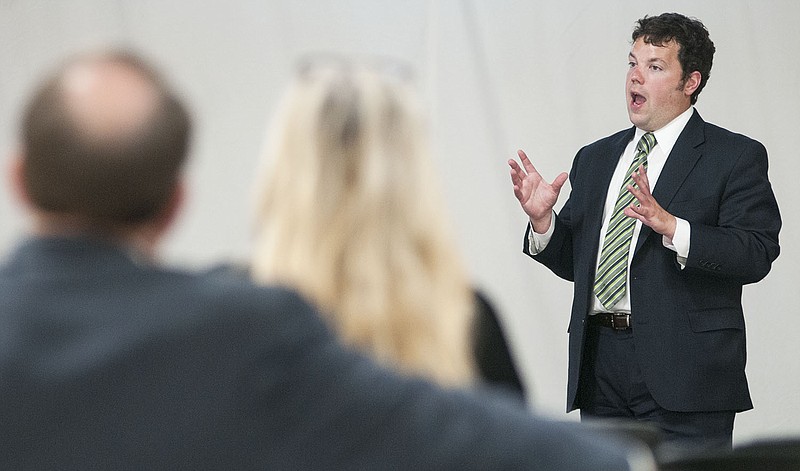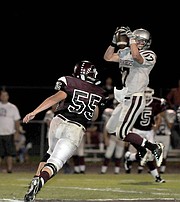With a dozen people in attendance, all three Callaway County commissioners expressed disappointment at the turnout for the use tax informational meeting they hosted at Fulton High School Wednesday night.
Fulton Mayor LeRoy Benton and Fulton Director of Administration Bill Johnson were the only representatives for local government in the audience - despite personal visits and invitations from the commissioners to all of the Callaway municipalities, encouraging city council and administration to consider joining them in placing a use tax before voters.
"This is a little disappointing," Presiding Commissioner Gary Jungermann said as he started the meeting a few minutes late in hopes of a few late arrivals. "I do appreciate the ones that are here."
Eastern District Commissioner Randy Kleindienst also made note of the lack of turnout, noting the commission had done its best to promote the event.
"We're trying to do the right thing and make sure citizens have a chance to understand this," Kleindienst said. "It's a shame we didn't have more participation tonight."
Despite the low numbers, both the commission and the city said they plan to put a use tax question before voters in August or November.
"We are, as a county, putting it on the ballot," Jungermann said. "(Voters) need to make the decision. We've got to go to the voters to decide if they want to keep the revenues we have or not."
Noting the city will have to do a separate issue for its own use tax, Johnson said "I think we're going to try to put it on the ballot at the same time."
Jungermann said that is what the county hopes to do - have all of the local government entities that plan to pursue a use tax put their questions before voters at the same time.
"Ultimately, we need to work as a team, we need to be saying the same thing so we can educate people," he said.
Explaining the use tax
Brian Schmidt, owner of the public policy analysis firm Missouri Wonk, was the guest speaker for the evening, appearing courtesy of the Missouri Association of Counties.
According to Schmidt, a use tax is imposed on retail sales of tangible personal property and certain services and applies to purchases made outside the state and is intended to eliminate the unfair economic advantage interstate sellers have over hometown merchants.
"It's intended to minimize the incentive to purchase from out-of-state sellers by equalizing the tax burden on intrastate and interstate purchases," Schmidt said, adding, "It removes the pressure to increase other local taxes to make up for lost tax revenues."
He said local option use taxes - such as those being considered in Callaway - are equal to that taxing entity's sales tax (1 percent in Callaway County) and do not apply to purchases from Missouri retailers.
Schmidt said a bill passed during the 2013 legislative session imposes a sales tax for titling motor vehicles, trailers, boats an outboard motors. He said House Bill 184 also requires local municipalities to pass a use tax ballot measure between November 2014 and November 2016 in order to not lose out on out-of-state sales tax revenue on big-ticket items starting in 2017.
Losing revenue
"To me, it boils down to an issue of fairness. Is it fair to local businesses to charge someone who walks in the door a sales tax, when that person can drive two hours to get it without the sales tax, but they still want it to be serviced and taken care of here?" Johnson said. "From a community standpoint, this is going to cost Fulton $30,000 to $40,000 per year."
Jungermann said that according to the Missouri Department of Revenue, Callaway County stands to lose an estimated $110,000-$120,000 a year without the use tax.
To illustrate the impact for Fulton, Johnson said that $30,000 is one police car that would not be purchased each year. Jungermann said for the county, $100,000 is a car, an officer and all the accompanying equipment for the sheriff's office.
"In order for local government to provide services, we have to have that revenue," Jungermann said. "If we start losing revenue, something's got to give. Ultimately, if counties and cities do not pass this, they're going to be in trouble. They're going to lose revenue.
"My question is, what services do you want to keep? It's a scary thought, and it should be a scary thought for tax payers. At the end of the day, you have to ask yourself, what do you want?"
Educating the public
Those gathered at the high school Wednesday night agreed that the key to garnering support for a use tax in Callaway County - and keeping that revenue - is informing constituents about local leaders' reasons for pursuing the issue.
"If we can get out there so people have an understanding of what it's about, that's our only hope," Jungermann said. "That's why we wanted to have this meeting, so people could understand what we're doing."
Johnson agreed, adding, "If they understand it and are informed, they'll make the wise choice."
Jungermann said he has a copy of Schmidt's slide show, and both he and Johnson mentioned taking that slide show to local civic groups as a possible next step toward educating the public about the use tax.


